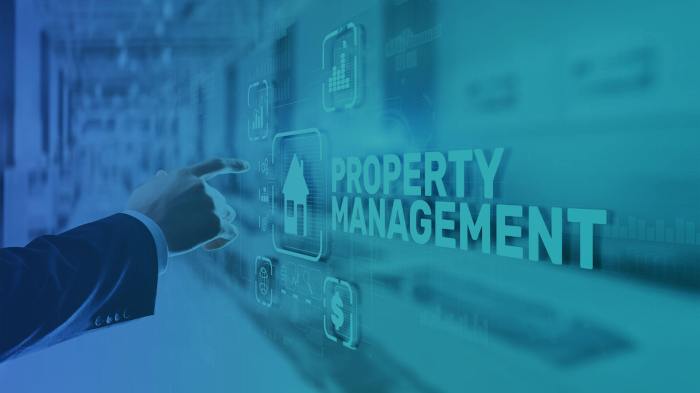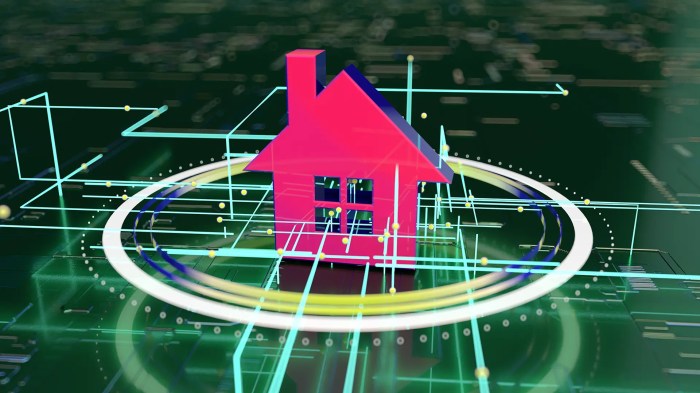With AI property management taking center stage, this paragraph sets the scene for an exciting exploration of how artificial intelligence is reshaping the way properties are managed.
Exploring the key technologies and benefits, this discussion dives deep into the impact of AI in property management.
Overview of AI in Property Management

AI is transforming the way property management operates, offering innovative solutions to streamline processes, enhance efficiency, and improve overall tenant satisfaction. By leveraging AI technologies, property managers can automate tasks, analyze data, and make more informed decisions, ultimately leading to cost savings and increased productivity.
Key AI Technologies in Property Management
- Chatbots: AI-powered chatbots can provide instant responses to tenant inquiries, schedule maintenance requests, and even handle lease renewals.
- Predictive Analytics: By analyzing historical data, AI can predict maintenance issues, tenant turnover, and property value fluctuations, allowing managers to proactively address potential issues.
- Smart Building Systems: AI can optimize energy usage, monitor security systems, and even adjust lighting and temperature settings based on occupancy levels, enhancing overall building efficiency.
Benefits of Implementing AI in Property Management
- Increased Efficiency: AI can automate repetitive tasks, such as rent collection and maintenance scheduling, freeing up time for property managers to focus on more strategic initiatives.
- Enhanced Tenant Experience: AI technologies like chatbots can provide 24/7 support, improving communication and responsiveness to tenant needs.
- Cost Savings: By predicting maintenance issues and optimizing energy usage, AI can help reduce operational costs and maximize ROI for property owners.
Applications of AI in Property Management

AI technology is revolutionizing the way property management is conducted, offering innovative solutions to streamline processes and enhance efficiency. Let's explore some key applications of AI in property management:
AI Applications for Property Maintenance
AI-powered tools can analyze data and predict maintenance needs before issues arise, allowing property managers to schedule repairs proactively. For example, sensors integrated with AI can monitor equipment performance and alert maintenance teams when attention is required. This predictive maintenance approach helps prevent costly breakdowns and ensures optimal functioning of property systems.
Streamlining Tenant Communication and Interactions
AI chatbots are being used to automate responses to tenant inquiries, schedule maintenance requests, and provide information about lease agreements or community amenities. These chatbots can offer instant support to tenants, improving communication efficiency and enhancing tenant satisfaction. Additionally, AI can personalize communication based on tenant preferences, creating a more engaging and tailored experience.
Optimizing Rental Pricing Strategies
AI algorithms can analyze market trends, property features, and historical data to determine optimal rental pricing strategies. By leveraging AI-powered pricing tools, property managers can set competitive rental rates that maximize revenue and occupancy rates. This data-driven approach allows for dynamic pricing adjustments based on demand fluctuations, ensuring properties are priced appropriately in real-time.
Challenges and Limitations of AI in Property Management
AI technology in property management offers numerous benefits, but it also comes with its fair share of challenges and limitations that need to be addressed for successful implementation. Let's explore some of the key challenges and limitations below.
Challenges in Implementing AI in Property Management
- Data Quality and Integration: AI systems heavily rely on accurate and comprehensive data. Ensuring data quality and integrating data from various sources can be a significant challenge.
- Cost of Implementation: Implementing AI technology in property management can be costly, especially for smaller property management companies.
- Resistance to Change: Some property managers may be hesitant to adopt AI technology due to fear of job displacement or lack of understanding of how AI can benefit their operations.
Limitations of AI Technology in Handling Complex Tasks
- Complex Decision Making: AI may struggle with handling complex decision-making processes that require human intuition and judgment, especially in unique or unprecedented situations.
- Lack of Emotional Intelligence: AI lacks emotional intelligence, which can be crucial in property management scenarios that involve tenant interactions or negotiations.
- Security Concerns: AI systems can be vulnerable to cyber attacks and data breaches, posing a risk to sensitive property management information.
Overcoming Challenges and Maximizing Benefits of AI in Property Management
- Investing in Data Quality: Property managers need to prioritize data quality and invest in data integration tools to ensure AI systems have access to accurate and reliable data.
- Training and Education: Providing training and education to property management staff on how AI can enhance their workflows and improve efficiency can help overcome resistance to change.
- Human-AI Collaboration: Emphasizing the collaboration between AI technology and human decision-making can help leverage the strengths of both for optimal property management outcomes.
Data Security and Privacy Concerns
Data security is a critical aspect of AI-driven property management, especially when it comes to handling sensitive tenant information. AI systems must ensure the protection of this data to maintain trust and compliance with privacy regulations.
Importance of Data Security
Ensuring data security in AI property management is crucial to safeguarding sensitive information such as tenant personal details, financial records, and property-related data. Any breach in data security can lead to severe consequences, including legal liabilities, financial losses, and damage to the reputation of property management companies.
Protecting Sensitive Tenant Information
AI systems can protect sensitive tenant information through encryption techniques, access controls, and secure data storage protocols. By implementing robust cybersecurity measures, AI property management solutions can prevent unauthorized access to confidential data and mitigate the risk of data breaches.
Best Practices for Data Privacy Compliance
- Implementing data encryption: Encrypting sensitive data both at rest and in transit can help prevent unauthorized access and protect information from cyber threats.
- Adhering to privacy regulations: Compliance with data privacy laws such as GDPR and CCPA is essential to ensure that tenant information is handled in a transparent and lawful manner.
- Regular security audits: Conducting routine security audits and assessments can help identify vulnerabilities in AI systems and address them promptly to enhance data security.
- Employee training: Providing comprehensive training to staff members on data security practices and protocols can help prevent human errors that may compromise sensitive information.
Summary

In conclusion, AI in property management offers a glimpse into the future of efficient and data-driven property operations. From streamlining tenant interactions to optimizing pricing strategies, the potential for AI to transform the industry is vast and promising.
FAQ
How can AI improve property maintenance?
AI can automate maintenance schedules, predict equipment failures, and optimize repair processes, leading to more efficient property upkeep.
What are the challenges of implementing AI in property management?
Challenges may include initial setup costs, resistance to change from staff, and potential data integration issues with existing systems.
How does AI protect tenant information in property management?
AI systems employ encryption, access controls, and secure databases to safeguard sensitive tenant data from unauthorized access.
What are the best practices for ensuring data privacy in AI property management solutions?
Best practices include conducting regular security audits, implementing data encryption protocols, and ensuring compliance with data protection regulations.














